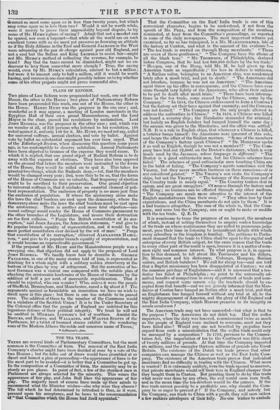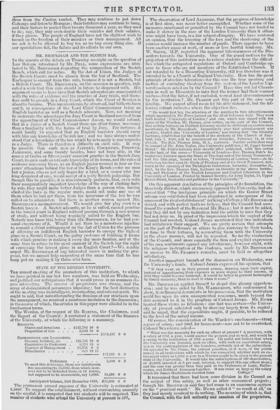THE TEA TRADE.
THERE are several kinds of Parliamentary Committees, but the most common is the Committee of form. The renewal of the East India Company's charter might have been decided at once by a vote of the two Houses; but the folks out of doors would have grumbled at so direct and honest a plan of proceeding—the appearance of force is for the most part to be avoided—it is better that a Committee be got up. In the composition of a Committee of form, the minority may be as sturdy as you please. In point of fact, a few of the sturdiest men in Parliament are always selected for the minority. This wears the appearance of fair play, and John Bull likes the appearance of fair play. The majority must of course have made up their minds to recommend what the Minister wishes—else why were they chosen? The bill which he had determined to introduce is thus, as it were, pressed u_wn his 'acceptance, and he bows to the recommendation of" that Committee which the House had itself appointed:' That the Committee on the East_l India trade is one of this convenient character, begins to be understood, if not from the speech of Mr. PEEL, and from the composition of the members nominated, at least from the Committee's proceedings, as reported in some of the daily newspapers. The most important witness yet examined, so far as has transpired, is a Mr. MARJORIBANKS, late of the factory at Canton, and what is the amount of his evidence ?— " The tea trade is carried on through Hong merchants." " There are seven of these gentlemen." " The Company have the choice of all the black teas." " Mr. THOMPSON, of Philadelphia, declared before Congress, that he had lost 800,000 dollars by the tea trade." " Hocqua, one of the Hong, told Mr. M. he had given up the American trade as unprofitable ;" his loss in dollars is unknown. " A Sicilian sailor, belonging to an American ship, was condemned lately after a mock trial, and put to death." " The Americans did not interfere, because he was not an American." " The American agent threw up his office in consequence, and the Chinese have ever since thought very lightly of the Americans, who allow their sailors to be put to death after mock trials." " There have been interrup- tions in the tea trade, some caused by the Chinese, some by the Company." " In 1814, the Chinese endeavoured to form a Couoivo ! but the factory set their faces against that enormity, and the COHONG was not formed." " The Company are the only people allowed to address the authorities in Chinese." " In 1814, a Chinese was killed on board a country ship ; the Mandarins demanded the criminal ; but luckily an English butcher had hanged himself the same day ; the carcase was given to the Mandarins, and the affair was settled." N.B. It is a rule in English ships, that whenever a Chinese is killed, a butcher hangs himself: the Americans were ignorant of this rule, and hence the affair of the Sicilian mariner. "Some of the members of the Company's factory speak Chinese !" "Dr. MORRISON spoke it as well as English, though he was not a member !!" "The Com- pany have laid out 12,0001. on the Doctor's dictionary, which is very much used by the Javanese, whose language is different." "The Doctor is a good enthusiastic man, but his Chinese schemes have failed." The schemes of good enthusiastic men touching China are in the habit of failing. "The Company's agents sometimes visit the Viceroy, but they never mention business on these occasions—it is not considered genteel." " The Viceroy's son visits the Company's ships, but not the Viceroy." "The tonnage of the European and of the Country trade is nearly equal." "The Country tiaders deal in opium, and are great smugglers." Of course through the factory and the Hong ; no business can be effected through any other medium. "The Company are much more attentive to the interest of the English manufacturers than their own." "They often lose by their exportations, and the China merchants do not gain by them." It is a bad business altogether. The sum of the whole is, that the Com- pany, and none but the Company, can or ought to make or meddle with the tea trade. Q. E. D.
It is wearisome to trace the progress of an inquest, the members of which, instead of setting themselves to acquire such a knowledge of the trade on whose continuance they are called to pronounce judg- ment, pass their time in listening to insignificant details With which every schoolboy in the kingdom is familiar. The petitions to Parlia- ment demand that the trade to China shall be open to the capital and enterprise of every British subject, for the same reason that the trade to every other part of the world is open, because it is a matter of com- mon right and common interest. To what purpose is it, in opposi- tion to this demand, to tell about Mr. THOMPSON and his dollars, Dr. MORRISON and his dictionary, Cohongs, Hocquas, Sicilian sailors, and British butchers ? We call for cheap tea—and are told that a Baptist missionary has been disappointed at Canton ; we ask the common privilege of Englishmen—and it is answered that a tea- dealer has failed at Philadelphia ; we point to the universally ad- mitted benefits of competition in every department of trade and com- merce, and request some reason why the tea-trade should be ex- cepted from that benefit—and we are gravely informed that the Man- darins at Canton have hanged an Italian after a mock trial, and that an Englishman has hanged himself without any trial at all, to the mighty disparagement of America, and the glory of Old England and the East India Company, which Heaven preserve in its integrity in secula seculorum !
The American trade may not have succeeded—but what is that to the purpose ? The Americans do not drink tea. Had the coffee importers, when the duty was lowered, commissioned twice as much as the people of England were inclined to consume, must not they have failed also ? Would any one not besotted by prejudice have argued from such a miscalculation that the coffee trade could only be managed by a corporation ? In 1783, previous to the Commu- tation Act, the importation of tea to the Continent was little short of twenty millions of pounds. At that time the Company imported six millions, and the smuggler thirteen millions of pounds into Great Britain. The existence of the Dutch tea trade proves that other companies can manage the Chinese as well as the East India Com- pany. The existence of the American trade proves that individual merchants find no difficulty in trading with the Chinese. What more is wanted ? It is extremely unlikely, were the trade opened to-morrow, that private merchants would sell their teas in England cheaper than they bought them in Canton. But granting them to do by this trade what never was done by any other, the evil would soon cure itself, and in the mean time the tea-drinkers would be the gainers. If the free trade cannot possibly be a profitable one, why should the Com- pany be so eager to prevent At? If the Company, and nobody but the Company, can trade to China with a profit, they will soon sicken a few reckless interlopers of their folly. No one wishes to exclude them from the Canton market. They may continue to put down Cohongs and listen to Hocquas ; their butchers may continue to harp-, and their factors to pocket their twenty thousand a year, as they used to do ; nay, they may even double their suicides and their salaries, if they please. The people of England have not the slightest wish to trench on the freedom a their murders or their management. All we ask is to be allowed to buy tea as we buy every thing else. If our speculations fail, the failure and its effects be our own.



















 Previous page
Previous page